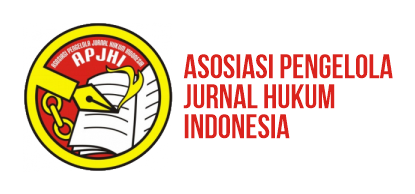The Urgency of Regulation and Governance of Artificial Intelligence (AI) in Indonesian Finance: Comparison and Risk-Based Implementation
Main Article Content
Afiq Ahmad Hanif*
Hasbir Paserangi
Arni Viratami Cahyani
The rapid advancement of Artificial Intelligence (AI) presents significant opportunities and considerable challenges for the Indonesian financial sector. This paper examines the urgent need for a comprehensive regulatory framework and adaptive oversight mechanisms to govern AI applications in digital financial services in Indonesia. Currently, existing regulations are fragmented and insufficient to address the complexities of AI, including algorithmic accountability and potential biases that could lead to consumer detriment and systemic risks. This research employs a normative legal method, utilizing statutory, conceptual, and comparative approaches by benchmarking Indonesia's legal landscape against international best practices in the European Union, the United States, and Singapore. The study identifies a critical regulatory gap concerning legal liability for AI-induced losses, currently reliant on general civil code provisions (Article 1367 KUHPerdata) that may not adequately cover the autonomous nature of AI. It argues for the necessity of specific AI regulations focusing on risk-based approaches, transparency, accountability, and robust consumer protection, drawing insights from frameworks like the EU AI Act. The paper concludes by recommending institutional reforms and the strengthening of AI governance, grounded in Pancasila principles, to foster a secure, ethical, and inclusive digital financial ecosystem in Indonesia. This will ensure that AI innovation proceeds responsibly, safeguarding the public interest and national financial stability.
Barrett, A. M., Hendrycks, D., Newman, J., & Nonnecke, B. (2022). Actionable guidance for high-consequence AI risk management: Towards standards addressing AI catastrophic risks. ArXiv Preprint ArXiv:2206.08966.
Bayamlıoğlu, E. (2018). Transparency of automated decisions in the GDPR: an attempt for systemisation. Available at SSRN 3097653.
Dewi, F. S., & Dewayanto, T. (2024). Peran Big Data Analytics, Machine Learning, Dan Artificial Intelligence Dalam Pendeteksian Financial Fraud: A Systematic Literature Review. Diponegoro Journal of Accounting, 13(3).
Fraser, H., & y Villarino, J.-M. B. (2024). Acceptable risks in Europe’s proposed AI act: reasonableness and other principles for deciding how much risk management is enough. European Journal of Risk Regulation, 15(2), 431–446.
Kunwar, M. (2019). Artificial intelligence in finance: Understanding how automation and machine learning is transforming the financial industry.
Lukács, A., & Váradi, S. (2023). GDPR-compliant AI-based automated decision-making in the world of work. Computer Law & Security Review, 50, 105848.
Mahendra, G. S., Ohyver, D. A., Umar, N., Judijanto, L., Abadi, A., Harto, B., Anggara, I. G. A. S., Ardiansyah, A., Saktisyahputra, S., & Setiawan, I. K. (2024). Tren Teknologi AI: Pengantar, Teori, dan Contoh Penerapan Artificial Intelligence di Berbagai Bidang. PT. Sonpedia Publishing Indonesia.
Mazzini, G., & Bagni, F. (2023). Considerations on the regulation of AI systems in the financial sector by the AI Act. Frontiers in Artificial Intelligence, 6, 1277544.
Mikalef, P., Islam, N., Parida, V., Singh, H., & Altwaijry, N. (2023). Artificial intelligence (AI) competencies for organizational performance: A B2B marketing capabilities perspective. Journal of Business Research, 164, 113998.
Munusamy, M. M., & Hashim, A. (2021). An analysis of the ASEM Education Process and its role in higher education. European Journal of Education, 56(3), 468–481.
Nasman, N., Astuti, P., & Perwitasari, D. (2024). Etika Dan Pertanggungjawaban Penggunaan Artificial Intelengence Di Indonesia. Jurnal Hukum Lex Generalis, 5(10).
Ningsih, N. H. I., SE, M. M., Misnawati, S. H., Muthia Sakti, S. H., Ordiyasa, I. W., Dadin Solihin, S. H., Batari, H. F., SH, M. H., Primasari, N. S., & Akhyar, C. F. (2025). Hukum Ekonomi Digital: Regulasi Bisnis Di Era Teknologi. PT. Nawala Gama Education.
Pérez del Prado, D. (2025). AI, right to information and new forms of participation: the Spanish experience.
Pflücke, F. (2025). Data Access and Automated Decision-Making in European Financial Law. European Journal of Risk Regulation, 16(1), 11–23.
Redita, F. (2024). Menuju Era Digital: Tantangan Regulasi Bagi Penggunaan Artificial Intelligence Dalam Industri Perbankan. Prosiding Seminar Nasional Bisnis, Teknologi Dan Kesehatan (SENABISTEKES), 1(1), 10–16.
Ringe, W.-G., & Christopher, R. (2020). Regulating Fintech in the EU: the Case for a Guided Sandbox. European Journal of Risk Regulation, 11(3), 604–629.
Ririh, K. R., Laili, N., Wicaksono, A., & Tsurayya, S. (2020). Studi komparasi dan analisis swot pada implementasi kecerdasan buatan (Artificial Intelligence) di Indonesia. J@ Ti Undip: Jurnal Teknik Industri, 15(2), 122–133.
Roy, P. (2024). Enhancing Real-World Robustness in AI: Challenges and Solutions. J. Recent Trends Comput. Sci. Eng, 12(1), 34–49.
Santana, A., Afonso, P., Zanin, A., & Wernke, R. (2017). Costing models for capacity optimization in Industry 4.0: Trade-off between used capacity and operational efficiency. Procedia Manufacturing, 13, 1183–1190.
Satjipto, R. (2009). Penegakan Hukum suatu tinjauan sosiologis. Yogyakarta: Genta Publising.
Simbolon, Y. (2023). Pertanggungjawaban Perdata Terhadap Artificial Intelligence Yang Menimbulkan Kerugian Menurut Hukum Di Indonesia. Veritas et Justitia, 9(1), 246–273.
Smuha, N. A. (2025). Regulation 2024/1689 of the Eur. Parl. & Council of June 13, 2024 (EU Artificial Intelligence Act). International Legal Materials, 1–148.
Suryanegara, M. (2023). Proposal of the Indonesian Framework for Telecommunications Infrastructure Based on Network and Socioeconomic Indicators. Informatics.
Totschnig, W. (2020). Fully autonomous AI. Science and Engineering Ethics, 26(5), 2473–2485.
Truby, J., Brown, R. D., Ibrahim, I. A., & Parellada, O. C. (2022). A sandbox approach to regulating high-risk artificial intelligence applications. European Journal of Risk Regulation, 13(2), 270–294.
Zaenudin, I., & Riyan, A. B. (2024). Perkembangan Kecerdasan Buatan (AI) Dan Dampaknya Pada Dunia Teknologi. Jurnal Informatika Utama, 2(2), 128–153.
Ziqra, Y., Sunarmi, S., Siregar, M., & Leviza, J. (2021). Analisis Hukum General Data Protection Regulation (GDPR) Terhadap Data Pribadi Konsumen Dalam Melakukan Transaksi Online. Iuris Studia: Jurnal Kajian Hukum, 2(2), 330–336.















